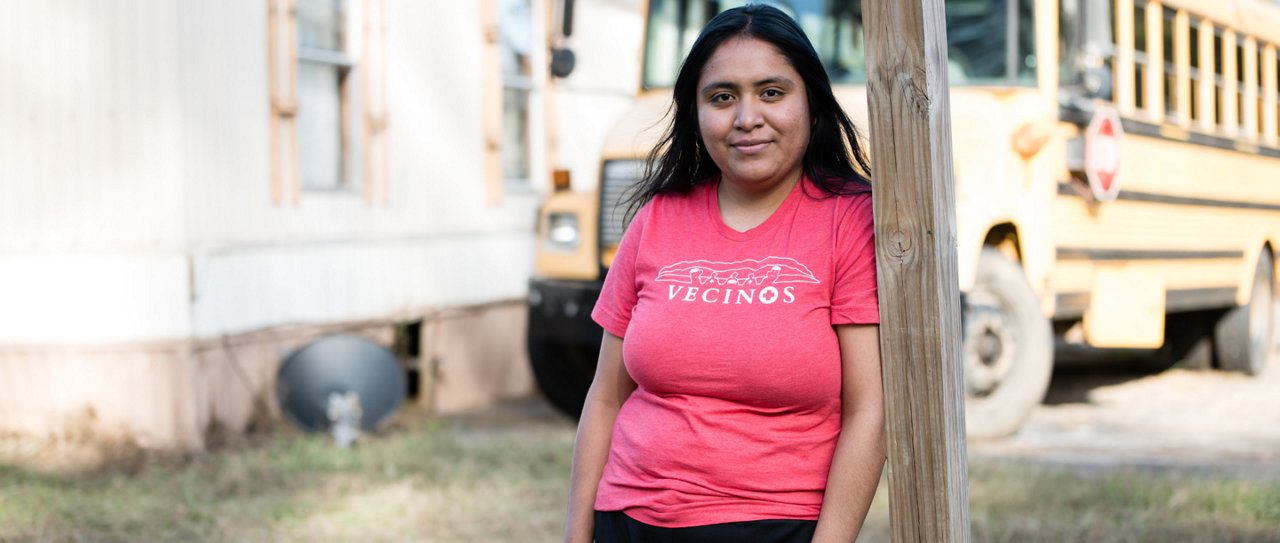Growing health for North Carolina’s migrant farmworkers

When you hear the word “Christmas,” certain images may spring to mind: houses framed in twinkling lights, gingerbread men, hot chocolate, maybe a Mariah Carey tune, and, of course, Christmas trees.
But behind the tinsel and ornaments is another Christmas story – one of a migrant farmworker putting in 14-hour days to cut down those trees. That migrant worker may come from anywhere in the world, but out in Western North Carolina, he is most likely a Mexican man who has arrived alone on an H-2A visa to work during a grower’s busy season and send money back home.
His days are long, so he relies on microwaved meals or fast food to eat. He doesn’t speak English, so he isn’t aware of helpful community resources, and he labors under deeply ingrained stigmas around his physical and mental health.
To top it off, as a farmworker, he’s probably only making around $11K a year.
H-2A migrant workers travel back to their countries between seasons, but there are seasonal farmworkers – many undocumented – who reside here permanently with their families, harvesting watermelons and strawberries in the summer, Christmas trees in the winter, and filling the gaps in between by cleaning houses or working construction jobs.
North Carolina relies on 150,000 of these farmworkers to carry out its agricultural operations, which account for one-sixth of its economy. Less than 20% have health insurance or workers’ compensation, which is alarming given that farm labor is one of the top three most dangerous occupations in the U.S., and the fatality rate for farmworkers in North Carolina is higher than the national average. Heat, exposure to toxic pesticides, bad nutritional habits, and poor living conditions are just some of the dangerous challenges farmworkers and their families face.
This is what makes the work of organizations like Vecinos so vital. Serving eight counties in western North Carolina, Vecinos offers integrated care services to a population of about 800-1,000 migrant and seasonal farmworkers, as well as many more uninsured, low-income adults within those communities.
Executive Director Marianne Martinez says the health care needs of the farming population in western North Carolina run the full gamut, from dental work to chronic illnesses like heart disease and diabetes.
“There’s a need for health education. There’s a need for access to healthy food. There’s a need for bilingual, affordable care,” she says.

Vecinos coordinates with the Office of Rural Health, colleges and universities, churches, and other free clinics in the region to cover as many of those needs as possible. Its clinic, located at Western Carolina University, has one full-time nurse practitioner and a team of volunteer doctors, clinical assistants, community outreach workers and behavioral health consultants – onsite and available in the evening when farmworkers finish their shift.
The organization also has two mobile clinics that visit the camps and locations throughout the region to provide clinical and mental health services.
Integrating these services is key for a community that faces so many barriers to good health, Martinez says.
“At Vecinos, primary care and mental health care work hand-in-hand. We do a multidimensional behavioral health screening on every patient. And our team then determines, “Okay, can they be seen by the doctor for this potential issue? Can they be seen by the therapist, or do they need to go to the psychiatrist or psychologist? What’s our triage level?”
“The research shows there’s major stigma associated with mental health, so providing those services in a primary care setting is the number one preferred way for people to seek mental health services.”
Founded in 2001 by Josie Ellis, RN, and Dr. Mark Heffington, Vecinos has experienced tremendous growth of late. In the past five years alone, the organization has gone from five employees to 30 – some of whom are the adult children of patients. “They’ve seen what Vecinos has done for their parents over the past 15 or 20 years, and it’s incredible to see how they’ve stepped up to fill these positions,” Martinez says.
Debora Alvarado, who serves as a community health worker for Vecinos, grew up in a family of seasonal farmworkers. Her mother, aunts, uncles and grandfather all worked cutting down Christmas trees at Wolf Creek Farm in Jackson County. She recalls helping her mother gather the fallen branches of trees to make wreaths to sell – a happy childhood memory. In the summer, her family would pick tomatoes and other fruits. “I grew up watching them work in the fields,” she says.
When the pandemic first hit, it was Vecinos workers in hazmat suits and PPE who showed up when Alvarado’s family became gravely ill with COVID.
“They were really, really sick. I remember Vecinos coming in with the mobile clinic, as well as the outreach team coming to my mom’s house, my grandparents’ house, my aunt’s house. And they were giving them medication, and just communicating with them [about] whatever they needed. I remember them bringing food boxes, medication, checking up on them constantly until they were stable. And also giving them telehealth appointments and making sure they were good. It was incredible to see.”
“My family received a lot of help from Vecinos,” she says. “I love what they stand for, which is giving back to the Latino community, helping migrant farmworkers or farmworkers that don’t have medical assistance receive great medical and mental health care.”

“I definitely wanted to be a part of that – talking more about mental health, because it’s just not talked about in the Latin community. I’m very grateful to be part of that journey and to see more people advocating for migrant farm workers, helping them learn more about mental health.”
Vecinos is part of Strengthen NC, a Blue Cross NC initiative to invest in historically under-resourced groups that have the knowledge and skills to best serve North Carolina’s people and communities of color. Blue Cross NC is helping to fund Vecinos and provide educational services by learning about specific challenges, and sharing knowledge and training.
It’s the work of Martinez, Alvarado and the rest of the Vecinos team that is leading change and encouraging farmworkers to take more advantage of mental and physical health services. Those services can range from providing them with recipes for meals that are quick and healthy, to triaging a leg pain being caused by something life-threatening, like thrombosis.
“I’m starting to see changes now, which is good with their lifestyle in general, with the way they eat, to the way they take care of their bodies, to their mental health,” Alvarado says. “Seeing that change, especially in the Latin community, is definitely improving. And I hope it improves a lot more. We take away the stigma of the, ‘Oh no, you’re fine. You don’t need to take care of yourself. That’s just for people who are delicate,’ or whatever. No, if you want to sustain your family, then it’s important for you to be physically and mentally well. That’s what has to happen if you want to have a better life.”
In every season – from holiday dinners to summer barbeques – North Carolinians rely on the hard physical labor of farmworkers to get food from the field to their tables. By supporting the needs of the farming community at the literal grassroots level, Vecinos and Blue Cross NC are investing in the wellbeing of our entire state – providing the people who live here permanently, or only for a month or two, with what they need most: healthy food, physical and mental care, and a sense of community.
See how Blue Cross NC is partnering with local organizations across North Carolina to help address the unique challenges in their communities.
Browse related articles


Blue Cross and Blue Shield of North Carolina does not discriminate on the basis of race, color, national origin, sex, age or disability in its health programs and activities. Learn more about our non-discrimination policy and no-cost services available to you.
Information in other languages: Español 中文 Tiếng Việt 한국어 Français العَرَبِيَّة Hmoob ру́сский Tagalog ગુજરાતી ភាសាខ្មែរ Deutsch हिन्दी ລາວ 日本語
© 2024 Blue Cross and Blue Shield of North Carolina. ®, SM Marks of the Blue Cross and Blue Shield Association, an association of independent Blue Cross and Blue Shield plans. All other marks and names are property of their respective owners. Blue Cross and Blue Shield of North Carolina is an independent licensee of the Blue Cross and Blue Shield Association.



